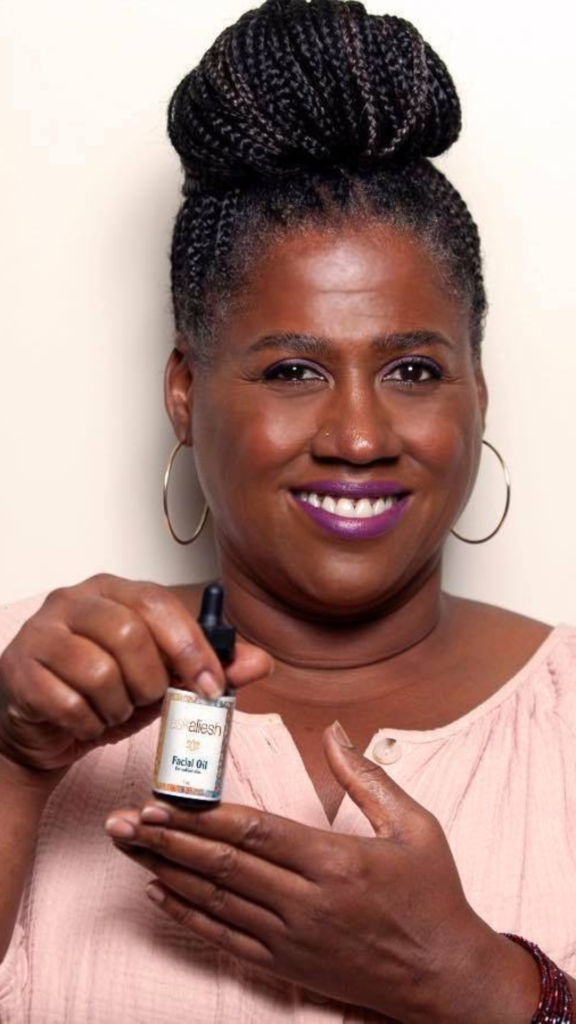Ayurveda, the ancient Indian system of medicine, has been using botanicals to treat skin conditions for over 5000 years. Estheticians with a focus on overall wellness use Ayurvedic medicinal herbs to treat various issues, ranging from minor inflammatory disorders/conditions like eczema and psoriasis to age related issues and acne.
For centuries Ayurvedic botanicals have been incorporated into treatments in many different ways. Traditionally the various forms include poultices, decoctions, ubtans (a form of scrub), powders, and oils. It is based on the principle that every individual is unique and has a distinctly different/unique constitution, which is determined by three doshas or energies – Vata (wind and ether), Pitta (fire), and Kapha (earth). The goal of Ayurveda is to maintain a balance of these doshas to achieve overall well-being.

SilcSkin Silicone Pads
Treat Wrinkles Like Doctors Treat Scars
SilcSkin Eye pads use the same philosophy to treat wrinkles that doctors use to treat scars after surgery. SilcSkin Pads are specifically designed to help reduce the appearance of wrinkles, bags and crepiness under the eyes and the crow’s feet area. Made of 100% medical grade silicone, they contain no allergy causing latex, urethanes, or adhesives.
8 Ayurvedic botanicals most commonly used in skin care:
- Ashwagandha (Withania somnifera)
Ashwagandha, also known as Indian ginseng, is one of the most widely used Ayurvedic botanicals. It’s an adaptogen. It is known for its apoptogenic properties, which means it helps the skin cope with stress. - Bakuchi
It is the seed of the Psoralea corylifolia plant, which has been used for centuries in traditional medicine. It contains a compound called psoralen, which is used in the treatment of various skin conditions.
Bakuchiol, on the other hand, is a natural compound that is found in the leaves and seeds of the Psoralea corylifolia plant. It is a relatively new ingredient in the cosmetic industry and has gained popularity as a natural alternative to retinol that causes less skin irritation and sensitivity.
- Brahmi (Bacopa monnieri)
Brahmi, also known as water hyssop, It is also used in cosmetics to improve the health of the skin and hair. Brahmi is used in creams, lotions, and oils to improve skin elasticity, reduce wrinkles, and promote hair growth.
- Neem (Azadirachta indica)
It is known for its antibacterial, antiviral, and antifungal properties. Neem is used in skin care to treat acne, eczema, and psoriasis.

Contribution by Aliesh Pierce
Aliesh Pierce is the founder of AskAliesh and the author of the textbook Treating Diverse Pigmentation. She’s an educator and brand strategist who entered the beauty industry over 30 years ago to establish herself as a celebrity makeup artist.
While holding the position of personal makeup artist to India, Arie, Yolanda Adams, and R.Kelly, she became interested in skincare. Upon obtaining her license, she began writing for trade magazines and was invited to collaborate on a project for Burn Survivors Throughout the World. This experience fueled her desire to offer the same quality of service to all clients, regardless of their ethnicity or the severity of their skin issues.
Inspired by her desire to share her philosophy with the next wave of master estheticians, she created the AskAliesh e-learning platform to share her expertise in skin physiology, cosmetic chemistry, product development, and brand strategy.
At the ongoing request of her peers, she also offers hands-on master aesthetics classes, where she trains estheticians on the proper use of chemical peels, advanced skin analysis, and electrical modalities. In addition, she continues to support marketing and sales teams seeking to build personal care brands that serve the multi-ethnic population.
- Shatavari (Asparagus racemosus)
Shatavari is another adaptation. It is to support overall health and well-being.
- Tulsi (Ocimum sanctum)
Tulsi, also known as holy basil, is a sacred plant in Hinduism. With strong antimicrobial properties, it is used to treat acne and reduce post-inflammatory hyperpigmentation.
7. Turmeric (Curcuma longa)
Turmeric has anti-inflammatory and antioxidant properties. It is used to brighten the skin, reduce pigmentation, and treat acne.
8. Triphala
Triphala is a combination of three fruits. It is used to detoxify the skin and improve the skin’s immune system.
Amalaki
This is also known as Indian gooseberry, is used to boost the immune system, and support healthy skin and hair.
Bibhitaki
This has wound healing properties that can be attributed to the tannins and ethanol present in the fruit. It is said to kill c. acnes and increase collagen production.
Haritaki
This is used to improve digestion, treat constipation, and promote weight loss. It is also used to support overall skin health and well-being.
Ayurvedic botanicals are generally safe when used in moderation and under the supervision of a qualified Ayurvedic practitioner. Some Ayurvedic herbs may interact with medications or cause side effects. Therefore, it is essential for estheticians to stay within the scope of practice and refer clients to a qualified Ayurvedic practitioner.
In conclusion, Ayurveda has a long history of using botanicals for medicinal purposes. The botanicals listed above are just a few examples of the many herbs used in Ayurvedic medicine. If you’d like to learn more about Ayurveda and other holistic modalities, go to LearnSkin.com to sign up for their Integrative Esthetician Certificate Program. To experience Ayurvedic Herbs used in skincare products, check out my line, Aliesh Skincare – each formula is a blend of clinical and Ayurvedic ingredients. Just go to AlieshSkincare.com.

